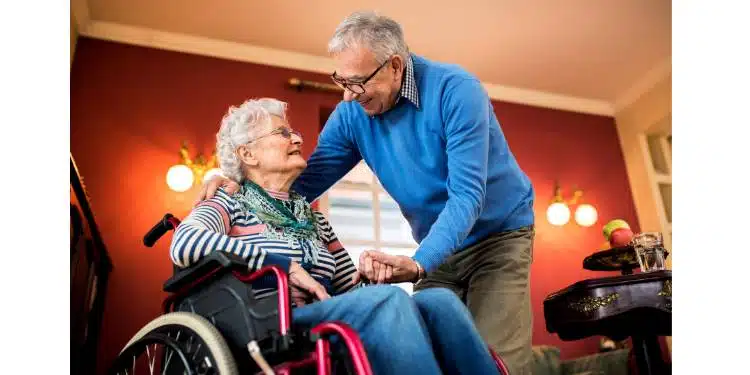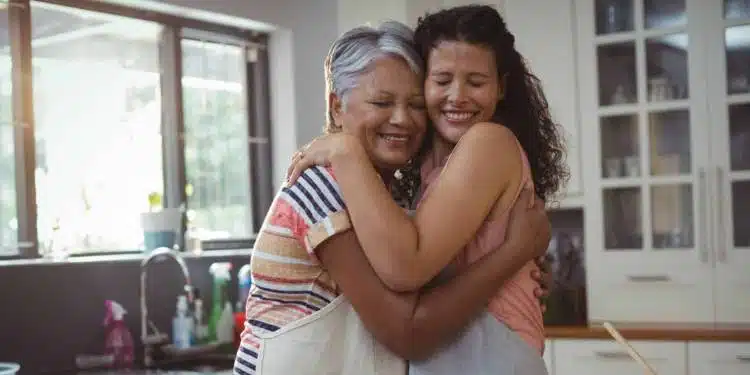by Emilia Bourland, OTR, ECHM
It’s 8:30 a.m., and a busy day is ahead of you. You’re about to start your first task when the phone rings. It’s your dad. He never calls this early, so you know it can’t be good. Turns out your mom fell last night – again. The ER says she doesn’t need to be admitted, but Dad says she looks pretty banged up. You hang your head, cover your face with your hands, and think to yourself, “This can’t keep happening. Mom and Dad need help.”
If this is a familiar scenario (or just one you’re dreading), you’ve probably thought about hiring a home care agency. But there are so many, and you’ve heard horror stories. How are you supposed to choose a good one? As a healthcare provider, industry insider (and fellow adult child), there are some key questions I would ask before choosing a home care agency.
3 Questions to Ask Before Choosing a Home Care Agency
What Medical Home Health Providers Do You Work With?
This question is CRAZY important, and I’ll tell you why. Part of the conundrum of non-medical home care is that even though the caregivers have a HUGE impact on the safety and health of their clients, they are, in fact, non-medical. Even though they might be the first ones to SEE something is amiss, they often don’t have the authority or skillset required to DO something about it. That makes it incredibly important for them to have a close relationship with a medical provider they can work with when issues arise.
To illustrate the importance, let me share with you an all-too-common story. I’m thinking of a woman, who we will call “Ann” here, but her scenario is one I’ve seen dozens of times during my career as an occupational therapist.
“Ann” was in her 80s, broke her hip from a fall, and subsequently required surgery. From the hospital, she went to a skilled nursing facility for rehabilitation, then home upon discharge with non-medical home caregivers. Once home, Ann started to spend more time in bed. She began to have more problems with pain, and incontinence and even began to develop some wounds. Ann’s family pushed for the caregivers to get her up more, but Ann was complex, and the caregivers weren’t equipped to manage her needs without healthcare support. Ann continued to decline and develop more problems. Eventually, she landed back in the hospital with a series of cascading medical events leading to hospice.
If Ann’s non-medical care agency had had a strong relationship with a good medical home health provider, it would have been much easier to connect Ann with services for medical support to prevent her decline. That doesn’t mean Ann’s situation was the fault of the agency, who ostensibly tried to do the best they could. In fact, without their care and efforts, she likely would have declined more quickly. But it does highlight how working as part of a team can help to avoid unnecessary, tragic scenarios.
This brings us to the second question you should ask any non-medical home care agency:
How Do You Communicate About Care Plans and New Issues?
To keep people safe, healthy, and happy there is no ingredient more important than communication. It’s just as vital in-home care as it is in an ICU. Caregivers and agencies need to have clear procedures for communicating care plans, needs, and concerns. Why? The person who spends the most time with the person needing care is the caregiver. When something is amiss, it’s usually the caregiver who notices it first. A strong communication process empowers the caregiver to communicate concerns to the right person quickly so action can be taken. This can literally be the difference between life and death.
Take, for example, a caregiver who notices their client suddenly seems confused. Because they know it’s the process of communicating changes, they call their supervisor, who then calls the family. The family is concerned about this sudden change, takes their loved one to the ER, and finds out their loved one has a UTI. Left untreated, such an infection can lead to sepsis and even death, but because of the clear communication of the caregiver, the client goes home with a prescription and shortly returns to normal. See? Life. Saved. We recommend you look for a home care agency that uses technology to ensure streamlined and efficient communication. For example, a company such as Foothold Technology could provide invaluable support.
How Often Are Your Caregivers Trained (and By Whom)?
I hope it’s obvious by now just how important I think non-medical care organizations and their caregivers are. These organizations and people are ESSENTIAL. They care for people with increasingly complex needs, who are being discharged from hospitals and rehab earlier and earlier, and who often have fewer family caregivers to rely on. It’s a serious, complicated, hard job. Their training should be treated accordingly, and as a consumer, you should ask about it. The more frequent the training, the better. Ideally, it should be provided by a licensed healthcare provider. Why? Because the ability of non-medical caregivers to prevent, recognize, and report common health concerns is vital to the welfare of those who rely on them.
Here’s a great example of why being trained frequently, by a knowledgeable healthcare provider, matters for caregivers. I was recently on a call with an absolutely wonderful, extremely experienced caregiver. We were talking about feeding safety, and as I was reviewing common “red flags” for aspiration (when food or drink go into the lungs), the caregiver became alarmed. It turned out she had 2 clients with serious “red flags.” As a result of the training, she reported her concerns. The caregiver later told me that both clients ended up receiving intervention to help prevent aspiration. One of the speech therapists providing treatment told the caregiver that she had likely saved her client’s life.
The Bottom Line
To be sure, there are other questions to ask before choosing a home care agency for your folks. “How do you prevent no-shows,” and “How long do caregivers stay with the agency” are also important to ask. But as a healthcare provider and a daughter, the 3 reviewed today are ones I wouldn’t make any choices without asking.
About the Author: Emilia Bourland, OTR, ECHM
 Emilia is the President and Founder at Higher Standards Caregiver Training. Higher Standards Caregiver Training provides practical, accessible, and expert-led training for caregivers and caregiving organizations. Offering both on-demand and LIVE courses taught exclusively by occupational therapists, Emilia strives to deliver gold-standard information and care practices to apply in the real world. The mission at Higher Standards Caregiver Training is to improve lives and businesses by revolutionizing the quality and accessibility of caregiver training. Visit the website for more information or contact Emilia directly by phone at 469-998-1245 or email at emilia.bourland@aipctherapy.com.
Emilia is the President and Founder at Higher Standards Caregiver Training. Higher Standards Caregiver Training provides practical, accessible, and expert-led training for caregivers and caregiving organizations. Offering both on-demand and LIVE courses taught exclusively by occupational therapists, Emilia strives to deliver gold-standard information and care practices to apply in the real world. The mission at Higher Standards Caregiver Training is to improve lives and businesses by revolutionizing the quality and accessibility of caregiver training. Visit the website for more information or contact Emilia directly by phone at 469-998-1245 or email at emilia.bourland@aipctherapy.com.

FAQs About Non-Medical Home Care Agencies
Here are some commonly asked questions we hear from readers about non-medical home care agencies.
What is a non-medical home care agency?
A non-medical home care agency provides non-medical assistance and support with activities of daily living (ADLs) for individuals who need help to remain independent in their own homes.
What services do non-medical home care agencies offer?
Non-medical home care agencies offer a variety of services, including companionship, meal preparation, light housekeeping, assistance with bathing and dressing, medication reminders, transportation, and mobility support.
How does non-medical home care differ from medical home care?
Non-medical home care focuses on assisting with daily living activities and does not involve medical procedures or treatments. Medical home care, on the other hand, includes medical tasks performed by licensed healthcare professionals.
Who typically uses non-medical home care services?
Non-medical home care services are often used by seniors, individuals with disabilities, people recovering from surgery or illness, and those who require assistance with daily tasks due to age or health-related issues.
Is non-medical home care covered by insurance or Medicare?
Non-medical home care services are typically not covered by Medicare or health insurance. Clients usually pay for these services out of pocket or through long-term care insurance, Medicaid (in some cases), or other private funding sources.
Are non-medical home care agencies regulated?
Regulations for non-medical home care agencies vary by state and country. Some states require licensing and oversight, while others may have fewer regulations in place.
What is the cost of non-medical home care services?
The cost of non-medical home care services depends on factors like location, the level of care required, and the agency’s pricing structure. Costs are typically billed on an hourly basis.
Always check with your local non-medical home care agency for specific information, as regulations and services may vary by location and agency.











Great suggestion on how you should find a caregiving agency that specializes in looking after the elderly if you have an aging adult. I like the idea of leaving my loved one in the capable hands of an expert when I’m busy working for their sake. I will consider your suggestion of finding a home care service company that can help my aging uncle if he needs them someday.
Thank you for taking the time to share your thoughts!